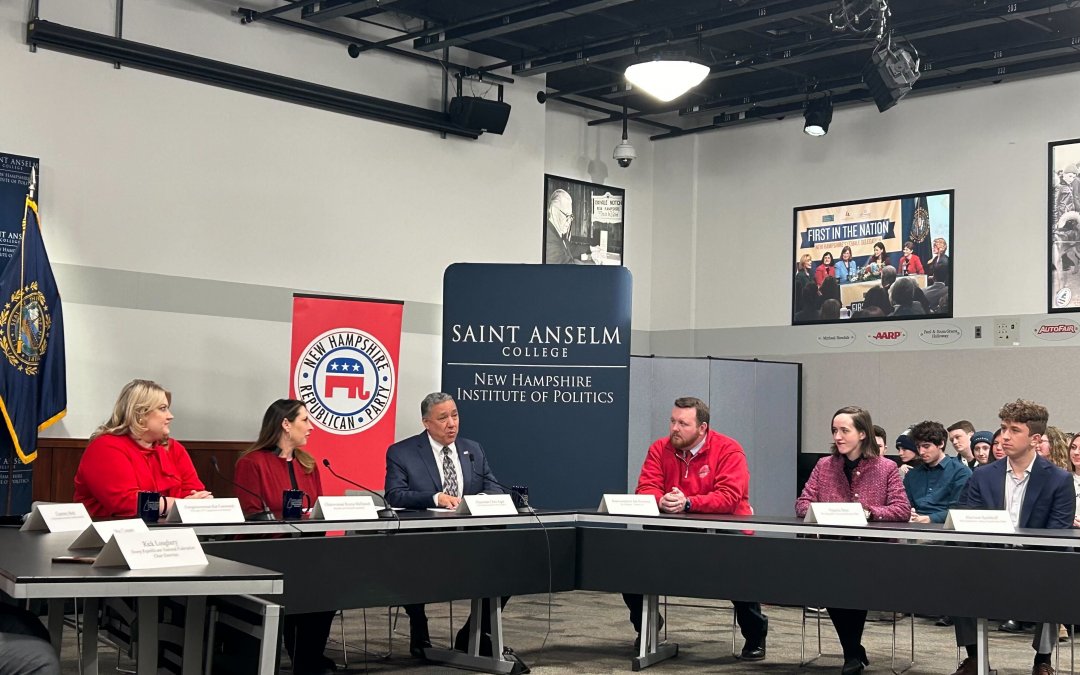MANCHESTER, N.H. – The frontrunner in the GOP presidential race, Donald Trump, is continually vowing that if he becomes president, he will “drill, baby, drill” for oil and gas.
Such a message, however, runs counter to efforts by the Republican Party to attract young voters, many of whom say they want to see the candidates talk about stronger solutions to tackling climate change. So far, the GOP’s strategy has been to change the delivery of its messages rather than the content.
“We’re young conservatives, we’re young Republicans. But we also believe that we need to protect the environment and that climate change is an issue that we need to be addressing,” said Chris Barnard, president of American Conservation Coalition Action, an environmentally focused group. “Both because it is an important issue, but also because it’s an issue that more and more voters care about, and Republicans will lose elections if they don’t seriously address it.”
To discuss winning over young voters, the established leadership of the Republican National Committee and New Hampshire Republican Party hosted a Youth Advisory Council Roundtable on Monday, the day before the New Hampshire primary. The roundtable, lasting just over 20 minutes, emphasized messaging as the solution for low youth engagement with GOP politics.
The party still has a long way to go toward peeling off votes from Democrats.
Generation Z, born 1997-2012, combined with millennials will make up the majority of eligible voters by 2028, and Biden won voters under 30 by 24 points in 2020.
A 2023 poll by Circle at Tufts, a nonpartisan research group that focuses on youth civic engagement, found that climate change is among the top three priorities for voters ages 18 to 34. And according to a 2022 Pew survey, 69% of Americans support the United States taking steps to be carbon neutral by 2050.
Rick Loughery, national chair of the Young Republicans, said during the roundtable that one way his group has increased contact between young voters and the Republican party is with social media guides explaining its policies.
Younger voters themselves are also thinking about the party’s outreach. The environment was one of three discussion points at a Future of Conservatism Roundtable on Jan. 16, co-hosted by New Hampshire Young Republicans, New Hampshire College Republicans and the American Conservation Coalition Action.
Barnard said his group asks Republican candidates to discuss their climate policies, with the goal of bringing the environment into mainstream political conversations.
“For Republicans, it’s not about either choosing climate extremism or climate denial,” Barnard said. “There’s a middle path there that we can take that is rooted in conservative principles.”
Former U.N. ambassador Nikki Haley’s climate stance is the most progressive compared to her main rival Trump as well as candidates who have since dropped out including Vivek Ramaswamy, Ron DeSantis and Chris Christie, according to the American Conservation Coalition Action website.
Haley promotes an “all of the above” energy policy, which would ramp up the country’s fossil fuel production while also investing in nuclear power. She also plugs her role in pulling the U.S. from the 2015 Paris Climate Agreement, which calls on nations to reduce greenhouse gas emissions to mitigate the widespread impact of climate change.
At a rally in Exeter a few days before the primary, Haley was confronted by a protester holding a sign reading “oil sellout” before he was dragged out of the auditorium.
Haley did address the generational divide within the Republican Party on climate policies.
“I also know that we have a lot of young people in the audience, and I know that y’all care about the environment,” Haley said. “But you know what I want to tell you? Everybody in this auditorium cares about the environment.”
Rally attendee Molly O’Connell, who said this year will be her first time voting, said she is excited about Haley, viewing her as a moderate choice between Trump and President Joe Biden.
“I like that she’s acknowledging that there’s the younger generation that wants to help the climate,” O’Connell said. “But she just didn’t really seem to have that big of a plan or anything.”
She added that Haley’s plan to increase fossil fuel production, which is the root cause of global warming, is “counterintuitive” if she wants to address climate change.
Dartmouth College government and politics professor Russell Muirhead said the generational divide in mainstream political parties – be they Republicans, Democrats or independents – concerns him.
He said first-time voters “want to look out at their country and see someone who ideally inspires them, but short of that just speaks to them.”
A lack of enthusiasm for participation is a problem all parties have to address. A 2023 Harvard Institute of Politics poll found that 56% of young Republicans say they are “definitely voting” in this year’s presidential race, down 10 percentage points from 66% in the fall of 2019. The percentage of young Democrats who responded that they are “definitely voting” fell slightly to 66%, from 68%, in the same period.
Muirhead said that when young voters do not vote because they are uninspired by the candidates, they could get into a habit of not voting. This could lead them to rally behind “demagogues” who reject the political system, he added.
“I’m really worried about the attachment of young people to our political system and to our political institutions,” Muirhead said. “I really, really worry about losing a whole cohort of young voters.”
CORRECTION: An earlier version of this article incorrectly stated that Generation Z was the country’s second-largest voting block in 2022.

